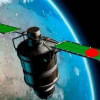Bangabandhu-1 launch process postponed, to resume tomorrow
Satellite launching company SpaceX has postponed its process to launch Bangabandhu-1 to the orbit due to a standard ground system auto abort.
It will resume the process tomorrow at 4:14pm US local time, SpaceX told in a tweet early today.
It means the launching process will resume at 2:14am (Bangladesh local time).
Asked about the reason of the postponement, State Minister for ICT Zunaid Ahmed Palak told The Daily Star, "There is nothing wrong with the rocket and satellite. Perhaps there were some technical glitch in operating system".
Before the postponement, Palak last night said that SpaceX has started their preparation for the launch, everything was in their favour including weather.
Standing down today due to a standard ground system auto abort at T-1 min. Rocket and payload are in good health—teams are working towards tomorrow's backup launch opportunity at 4:14 p.m. EDT, or 20:14 UTC.
— SpaceX (@SpaceX) May 10, 2018
Through this launching Bangladesh will enter into a historic journey of elite satellite club.
Bangladesh delegation led by Prime Minister's ICT Advisor Sajeeb Wazed Joy reached the Cape Carnival launching pad early last morning and learned about the final preparation.
All the people were five kilometres away from the launch pad to see the take-off with their own eyes.
Bangladesh's flagship venture Bangabandhu-1 satellite will be carried by newly built rocket Falcon-9.
The 3.7-tonne satellite will travel up to 36,000km from the launch pad before making adjustments for orbit and it will take 10 days for that.
The entire launch process has two phases -- in first phase is the Launch and Early Orbit Phase (LEOP) and the second phase is Satellite in Orbit. The LEOP phase will take 10 days while the second will take 20 days.
After the satellite becomes active, its control will shift to three ground stations in the US, Italy and Korea. The three stations will take control of the satellite and move it 300km to its assigned position (119.1 east longitudinal orbital slot), State Minister for ICT Palak said.
It will take nearly 20 days to bring the satellite under complete control, he said. Once it is completely operational, the control will be transferred to the ground stations in Bangladesh.
The country's first commercial satellite was manufactured by the Thales Alenia Space, a French firm at their facility from 2016 to 2017. After construction, tests, inspection and transfer the satellite was brought to the launching pad through a cargo flight on March 30.
The Falcon-9 rocket, which will carry the rocket, has four parts, with the satellite on top, followed by the adaptor, said Project Director Mohammad Mesbahuzzaman. Below the adaptor is Stage-2 of the rocket, while the lowest section is Stage-1.
During take-off, Stage-1 will fire and will carry the spacecraft upwards with tremendous speed.
At one point the Stage-1 rockets will be jettisoned and will fall back to Earth and the Stage-2 rockets will begin firing. Stage-2 will carry the spacecraft to 35,700km before being jettisoned and will linger in orbit at a certain distance from the satellite, he added.
It will take few more days for the control of the satellite to come to its Gazipur's Joydebpur and Rangamati's Betbunia ground station.
The satellite was originally scheduled for launching on December 16 last year but the devastation from Hurricane Irma delayed its scheduled launches from Cape Canaveral, Florida. Later it had re-scheduled several times but technical challenges pushed down to re-set it again and again.
The Bangabandhu-1 satellite has 40 transponders, one transponder equivalent to 36 Megahertz spectrums. According to the plan Bangladesh will use 20 transponders of them. The 20 others will be rented out to other countries especially in some South East Asian countries like Philippines and Indonesia.

 For all latest news, follow The Daily Star's Google News channel.
For all latest news, follow The Daily Star's Google News channel. 








Comments